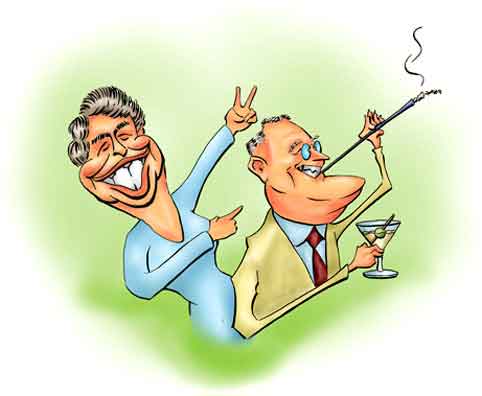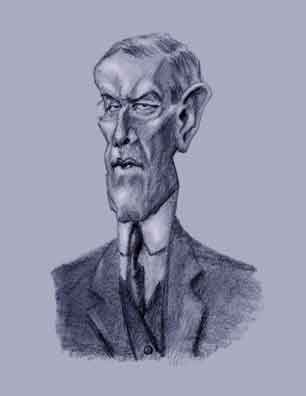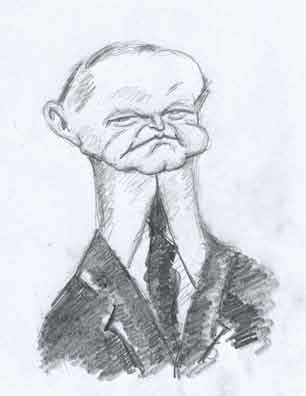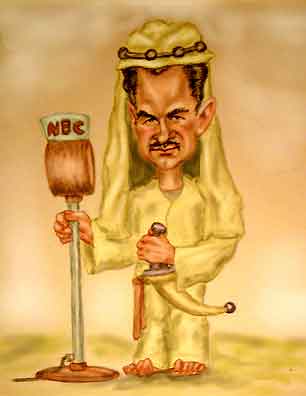Fifth Cousin Once Removed of a First Class Intellect

Eleanor and ...
(Hm. Just what WAS his name?
Anna Eleanor Roosevelt was born in 1884 and got along pretty well with her parents. She particularly liked her dad, Elliott, who although rich emphasized that people should help others and particularly the rich should help the poor. Although this is a virtually forgotten philosophy today, it wasn't that unusual in Eleanor's day.
The family not only was rich but also had good political connections. Elliott was in fact the younger brother of Theodore Roosevelt. Eleanor didn't see her dad as much as she'd have liked. Of course, like a lot of rich fathers he was away from home a lot. Much of this was on business and much of the business involved extended drinking binges or drying out from his binges. He kept in touch with Eleanor by letter writing - the non-electronic precursor of E-mail.
Elliott died when Eleanor was only eight. The actual reason is a bit obscure. You'll read the obvious that it was from his libertine lifestyle but other sources cite diphtheria. The caveat, though, is that neither cause is mutually exclusive.
Eleanor attended the Allenwoods School in England. This was a - quote - girls "finishing school" - unquote - a now defunct genre of educational institution which was primarily intended to teach rich young ladies the proper skills to enter fashionable society. Eleanor was a good student, and when she returned home at age 18, she taught school for the underprivileged (ergo, poor kids).
Where Eleanor met Franklin isn't clear. One story is they met when they were kids. Others say that they bumped into each other on a train trip. Yet others say it was at one of the fancy soirées that scions of rich families often attended. But whatever the circumstances - and again none of the accounts are mutually exclusive - they seemed to hit it off OK and they got married in 1905.
Although Teddy gave away the bride when Eleanor and Franklin got married, the two branches of the Roosevelt family didn't really get on that well. Alice - Teddy's hottie but rather catty daughter - didn't like Eleanor at all, sometimes imitating her cousin's noticeable malocclusion. By the time the 1930's rolled in, the Democrat Roosevelts and their Republican/Bull Moose counterparts were not on speaking terms.
Given his family name, it was natural for Franklin to start off on a political career and his rise in politics was fairly standard. He was elected to New York's State Senate in 1911 and after Woodrow Wilson won the presidency, he tapped Franklin to be his Assistant Secretary of the Navy. After Woodrow left office - still suffering from the effects of a debilitating stroke he suffered in 1919 - and following the Harding and Coolidge administrations, in 1928 Franklin was the running mate with James Cox, the famous presidential nominee who no one remembers. When Herbert Hoover won the election, Franklin returned to private life.

Woodrow Wilson
He tapped Franklin.
While vacationing with his family at his parent's summer home in 1921 at Campobello Island in New Brunswick, Franklin was struck with paralysis. Usually referred to as polio, Franklin's illness has been given alternative diagnoses which may or may not be correct.
We don't want to belittle Franklin's undoubted courage and resilience. Unable to walk for the rest of his life, he usually got around in a wheelchair, one he designed from an ordinary kitchen chair because he didn't like the idea of being wheeled around like an "invalid". Swimming also helped Franklin build up and strengthen his torso and arms.
Despite his handicap, Franklin returned to politics and was elected governor of New York in 1928. The election of a handicapped candidate is a testament to both Franklin's fortitude and the open-mindedness of the voters.
It's also a testament to Eleanor. She encouraged Franklin to stick with politics, although Franklin's mom, Sara, didn't agree (Eleanor's dealings with Sara - as with dealing with many-a mother-in-law could be, well, a bit testy). But when you get down to it, Franklin didn't want to give up politics, either.
And we must add Franklin's success in politics is also a testament to what was a far less visual age. Photographs and particularly films were quite sparse compared to today. With no television available, public figures were seen only in print and newsreels (Life Magazine only began publication in 1938). Even well into the 1960's, the panelists on What's My Line and To Tell the Truth didn't always need to be blindfolded when some celebrities appeared. The celebrities with the unknown faces included Sir Edmund Hillary (who had scaled Mount Everest a few years before), Jacques Cousteau (even then world famous for his underwater explorations and invention of the aqualung), and Arnold Palmer (who had just won his first Masters Tournament).
So there were just fewer opportunities for Franklin to be photographed in a manner that showed his handcap. He also had excellent relationships with the press and they more or less agreed not to show Franklin in an awkward moment. So when Franklin was photographed, he might be sitting in a chair eating hotdogs sitting petting Fala, his Scottie dog, swimming in a pool, sailing in a boat, and even standing up (by wearing a brace beneath his trousers), but rarely in his wheelchair.
Franklin's election as governor was also the year that Calvin Coolidge chose not to run for president. That left Herbert Hoover holding the bag for the Great Depression. "Hoover Prosperity" became a snide remark for the times and Franklin was easily elected president in 1932.
Refuting Herbert's policies that the Depression was a temporary problem that would soon be over, Franklin said it was the result of serious flaws in America's economic system. He began a number of programs famous for their initials and which were lumped together as "The New Deal".

Calvin Coolidge
He chose not to run.
OK. Did the New Deal help end the Depression? Well, we need to remember the story told by Vance Randolph in his iconic and masterful book Pissing in the Snow and Other Ozark Folktales.
A farmer was having digestive problems which produced effects that were driving his family out of their home. His wife told him to go to the doctor.
The doctor asked if the gentleman could give him an example of the problem. The farmer obliged and as soon as the doctor stopped gagging he exclaimed:
"My God! Something must have crawled up inside you and died!"
"Do this right away!" he said. "Go home and eat a big dish of raw onions with ground garlic and wild ramps for dinner, and drink two pints of beer. Then before you go to bed eat a half pound of Limburger cheese."
"Do you reckon all that will cure me?" the farmer asked.
"No, I don't think it will cure you," the doctor admitted. "But it might help some."
And certainly the New Deal did help some.
The New Deal created government programs that provided jobs to people from bricklayers to writers. And if nothing else the programs showed everyone that government was making an effort. Some of those who lived through the Depression believed Franklin and his policies, whether truly effective or not, prevented a revolution.
In the end, though, the Great Depression extended from 1930 to about 1940 (1938 was almost as grim a year as 1934). It only really ended when the country began ramping up for World War II. Although Franklin's approval rating was lowest in 1939, it reached its highest point in 1942 at 83 %.
Although Franklin had gone to the fancy private Groton School and then to Harvard and Columbia, he had been only a so-so student. Some will grump that this just shows us how scions of wealthy and influential families get preferential treatment in educational institutions. Maybe Franklin's lackluster performance in school is what prompted Oliver Wendell Holmes to say Franklin had a second-class intellect but a first class temperament.
Well maybe, and if indeed he said it. The usual source of the quote is a story told by one of Oliver's former Supreme Court clerks, Thomas Corcoran. Thomas was present when Franklin, then newly elected as president, paid a visit to Oliver who was then 92 and retired.
After Franklin left, Oliver turned to Thomas and mentioned that it was Franklin's uncle, Theodore Roosevelt, who had appointed him to the high court. Then Oliver commented "A second class intellect, first class temperament".
The quote, then, is most likely a reference to Teddy, not Franklin. But people have still stuck that label on Franklin, and it's even appeared in the title of one of Franklin's biographies.
Although Oliver (reportedly) said that Teddy was Franklin's uncle, actually Teddy was Franklin's fifth cousin. They shared a common great-great-great-great-grandfather, Nicholas Roosevelt, an early New York politician. So Nicholas was Eleanor's great-great-great-great-great-grandfather. This didn't make her Franklin's sixth cousin but a fifth cousin once removed as it's called. For Franklin to be Eleanor's sixth cousin, he would have had to have the same number of generations between him and Nicholas as she did. That is, Nicholas would also have had to be Franklin's great-great-great-great-great-grandfather as well.
For those who have heard speeches or interviews with Eleanor may take her to be a rather formal and even formidable lady. Actually she was pretty easy going. Shortly before Franklin's first inauguration, Mrs. Hoover (called Lou by her friends) offered to show Eleanor around the White House. When, Lou asked, would be a good time to send the limousine around?
Eleanor said, forget it. She was staying at the Mayflower Hotel and it was just a few blocks from the White House. She'd walk.
As First Lady Eleanor stayed pretty loose. When she learned that the White House Chief Usher was expected to operate the elevator when she wanted to go upstairs, she said forget it. She could operate the fool contrivance herself. Then when she found a group of workers rearranging furniture she pitched in and helped.
But we have to admit that when folks are rich they sometimes have trouble understanding the way real - or rather "ordinary" people have to live. During World War I, the word got out that Eleanor was an absolute wizard at conserving and not wasting food. A reporter was dispatched to talk to Eleanor about her thrifty ways and as a guide and inspiration to other Americans. During the interview she mentioned how she did the shopping, the family was careful in how much soap they used for the laundry, and everyone was encouraged to always think of new ways to cut waste and expense. And Eleanor then said that having "ten servants help me do my saving has not only been possible but also highly profitable."
Naturally this produced some rather mirthful yet sardonic comments from the non-gentrified population. Even Franklin got a chuckle out of Eleanor's faux pas and told Eleanor, he was "proud to be the husband of the Originator, Discoverer, and Inventor of the Household Economy for Millionaires!"
Probably the toughest time of Eleanor life was in the 1920's when she learned that Franklin had not been keeping to Hyde Park Family Values. Instead, he had been making sport with a young lady named Lucy Mercer. Eleanor found out about Franklin's dalliance when he had come down with pneumonia and she was handling his mail. Naturally Eleanor was devastated, and worse, Lucy had been Eleanor's own social secretary.
Of course, this episode didn't affect Franklin's popularity since none of the public knew about it. Before the later-20th century the press didn't delve deeply into a candidate's private life. Of course, a candidate's private life only became an issue only when the politicians made it so. When you trash your opponent because he doesn't live the life of Ozzie Nelson (whoever he was) you are in effect throwing down the gauntlet for others to dig up dirt on yourself. Naturally many reporters have been happy to oblige.
Ultimately Franklin promised to forswear his errant ways although it's not clear to what degree he did so. Certainly he and Lucy did see each other from time to time, and in fact Lucy was present while Franklin was getting his portrait painted on April 12, 1945.
Of course, then as now an officeholder's wife was expected to play the part of the political wife. That meant Eleanor should agree with and publicly endorse her husband's policies and proposals, and she was shocked! shocked! when she learned Franklin favored votes for women. Strangely Eleanor opposed what was then a radical innovation. At the same time her view wasn't that odd for the high-born proper ladies since they saw the suffragettes as a bit rough and rowdy gals.
Ultimately Eleanor and Franklin had five kids who grew up to some attainments - Anna Eleanor (their only daughter named after her mom), James, Elliott, Franklin Delano, Jr., and John. Elliott and James were the most politically minded of the bunch and both appeared on What's My Line either/and as a panelist or as the Mystery Guest.
In keeping with what her dad had taught her, Eleanor spent a lot of her time in trying to help and encourage the poor. She would volunteer at soup kitchens, give talks to underprivileged kids, and visit hospitals (including veterans who had mental problems arising from combat). Because Franklin did have limited mobility, Eleanor would stand in for him at functions that he couldn't attend. This included touring institutions - including prisons and mental hospitals - and reporting on the conditions (which were often sub-par).
Naturally as a public figure Eleanor had to give speeches and had to overcome what had been almost pathologically shyness since she was a kid. Franklin's advisor and friend, Louie Howe's advice was simply "Have something you want to say, say it and sit down."
Of course there's more to that than being a good speaker, and she asked the early radio broadcaster Lowell Thomas to give her elocution lessons. Although Lowell was always on the other side of the political fence from the Roosevelts he was glad to help. But Lowell said hadn't been instructing people in speech since his Princeton graduate school days and she needed someone who was an active teacher. So after checking with Dale Carnegie, Lowell and Dale decided that Elizabeth Ferguson von Hesse was the proper teacher for Eleanor.
One of Lowell's activities as the "Squire of Quaker Hill" in Pawling, New York, was hosting baseball games. This was the day when virtually all towns fielded any number of teams and since Lowell's team included both the wealthy and ordinary citizens, he dubbed it the Debtors and Creditors.
In the spring of 1933, Lowell knew that the Presidential entourage would take time off at the Roosevelt family home in near-by Hyde Park. Knowing the White House Press Corps would be in tow and that the accommodations weren't always first class for the reporters (they had to stay at the neighboring town of Poughkeepsie), he called up a reporter friend, Marvin, McIntyre. Lowell told Mac if he needed a break from the heat to stop by Quaker Hill where there was usually a refreshing breeze.
Instead of the six to eight reporters Lowell thought would show up, a hundred and thirty "guests" arrived - including all five of the Roosevelt kids. Realizing that his store of wine would run out after a reporter found the key to his cellar, Lowell immediately announced they would have a ball game. A quick phone call soon had the Debtors and Creditors lined up against the White House group.
The results were so hilarious - Lowell said that for years most reporters had done nothing more strenuous than pulling themselves up on a barstool - that even when some of Lowell's team were loaned to the hapless press team, the reporters still lost 10-0. Of course, with representatives from the nation's top papers present, it was inevitable that the ballgame would hit the news. Also Roosevelt's kids, no doubt between peals of laugher, told their dad of the debacle.
Franklin called Lowell the next day and asked why he hadn't been invited to the game. Lowell offered apologies and said his team could have used some encouragement. Franklin then suggested they play again the following week.
Although Lowell's ball games soon became a national institution (they once played to a packed audience at Madison Square Garden) the early games were often hosted at Lowell's home. When Franklin was at Hyde Park he would traverse the 20 miles to Pawling and make sure to field a team against Lowell's. Eleanor often showed up at the games, but she preferred simply to knit while sitting on the running board of the President's car while her husband would direct his team.
The games sometimes provided humorous comment on the political times. Franklin had been trying to expand the Supreme Court from the nine justices although he assured everyone he wasn't just trying to "pack the court" to ensure his more touchy New Deal legislation would be ruled constitutional. Instead, he said his purpose was just to relieve the heavy burden for the nine old men on the court.
Lowell, who always liked tweaking noses as much as anyone, then changed the name of his team. So for one game the players came on field with new jerseys with the team logo, The Nine Old Men. Franklin, though, had gotten wind of the plan and had his own team show up with their new name embroidered on their uniforms: The Roosevelt Packers.
In addition to the reporters (who kept the games in the news), celebrities of the day would show up. There was Jack Dempsey who still looked formidable but usually popped up or fanned out. There was Gene Tunney (who liked to pitch as well as read Shakespeare), opera singer and movie star Geraldine Farrar, Gloria Swanson (whose later film Sunset Boulevard won her an Academy Award), and even the famed ecdysiast, Sally Rand.
The games were usually played on Sunday which shocked many of the more traditional Americans. But they were mollified a bit when Branch Rickey who was part owner of the Brooklyn Dodgers showed up. Branch was himself a pious man and never went to ball games on Sundays. But he made an exception with Lowell's games. Of course Branch's real claim to fame was he broke the color barrier in baseball by hiring Jackie Robinson
Even when the games were played at Pawling, the pressures of office meant that Franklin's appearances had to drop off. So if he was absent the - ah - "other" Roosevelts might take the field. With such an opportunity, Lowell couldn't resist a prank.
Alice's brother, Teddy Roosevelt, Jr., was at bat when unbeknownst to the players Lowell arranged to have a comedian named Billy Van be driven onto the field. Billy specialized as a Roosevelt imitator, and so when Teddy, Jr., saw "Franklin" being chauffeured into the outfield he didn't know what to do. Ted, Jr., still not on the best terms with Franklin, nevertheless couldn't simply ignore the current President whatever he may have personally felt. But then Lowell whispered the "President's" true identity. Teddy played along and jumped on the running board to shake "Franklin's" hand. The papers ran the photo showing the reconciliation of the two Roosevelt branches.

Lowell Thomas
The games were a national institution.
Although today the president's physician always assures everyone they will report the president's health, there is a great deal of suspicion that reporting the president's health and reporting it accurately are two different things. Although not revealed at the time, Franklin had a number of health problems particularly in his last few years. He had severe iron deficiency but this was successfully treated with iron supplements. He also had attacks of cholescyctitis, a gall bladder infection which produced stomach pains so intense he was treated with the opiate codeine. Franklin also had a subcutaneous cyst removed from the back of his head and there is the possibility he had melanoma above his eye which was likewise removed surgically.
And, of course, he smoked.
That Franklin was hypertensive is well known and he kept to a blood pressure of about 210/110. Naturally at a time when medical treatment for high blood pressure was limited, his ever-present cigarettes didn't help. Franklin died of a cerebral hemorrhage on April 12, 1945, at age 63, in Warm Springs, Georgia, while having his portrait painted.
The baseball games with Lowell, though, had ended long before. In the spring following Pearl Harbor Lowell received a short note in the mail:
Dear Lowell,
I am afraid Hitler has ended our ball games for the duration.
As ever yours,
FDR
References and Reading
Eleanor Roosevelt: A Photo-illustrated Biography, Lucile Davis, Capstone, 1998.
A First Class Temperament: The Emergence of Franklin Roosevelt, 1905-1928, Geoffrey Ward, Random House, 2014.
"Presidential Approval Rating", American Presidency Project, University of California - Santa Barbara
"Not So! Popular Myths About America's Past From Columbus to Clinton", Paul F. Boller, Jr., Oxford University Press, USA (1995)
"Presidential Wives", Paul F. Boller, Jr., Oxford University Press, 1988 (Revised Edition: 1998).
Good Evening, Everybody: From Cripple Creek to Samarkand, Lowell Thomas, William Morrow and Company, 1976.
So Long Until Tomorrow: From Quaker Hill to Kathmandu, Lowell Thomas, William Morrow and Company, 1977.
"Questions and Answers about Eleanor Roosevelt: Question: How was ER related to FDR?", Eleanor Roosevelt Papers Project, George Washington University.
"Speech Teacher to the First Lady of the World", Helen Jane Wamboldt, Communications Quarterly, No. 12, November 1964, pp. 5-6.
Hissing Cousins: The Untold Story of Eleanor Roosevelt and Alice Roosevelt Longworth, Marc Peyser, and Timothy Dwyer, Nan A. Talese (Publisher), 2015
"What is a First Cousin, Twice Removed? Figuring Out Family Relationships", Geneology.com, http://www.genealogy.com/articles/research/16_cousn.html
Good Evening, Everybody: From Cripple Creek to Samarkand, Lowell Thomas, William Morrow and Company, (1976).
The Health of the Presidents: The 41 United States Presidents Through 1993 from a Physician's Point of View, John Bumgarner, 1994.
"Medical History of American Presidents", http://www.doctorzebra.com/prez/.
Pissing in the Snow and Other Ozark Folktales, Vance Randolph, University of Illinois Press (1976).